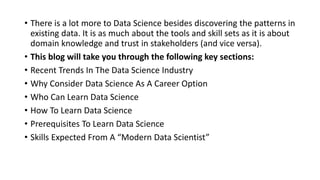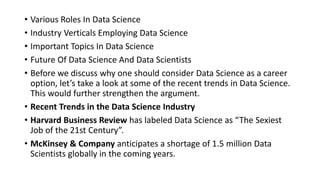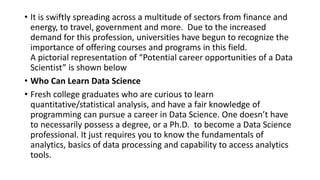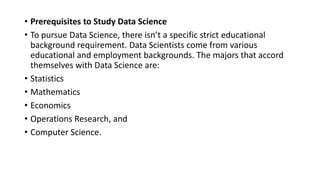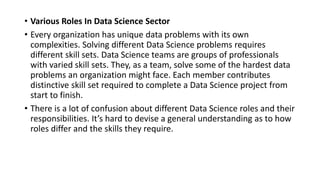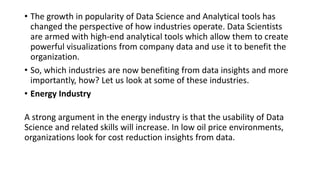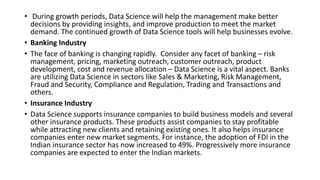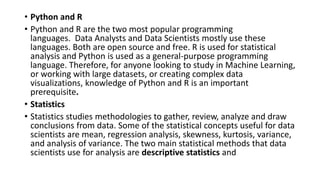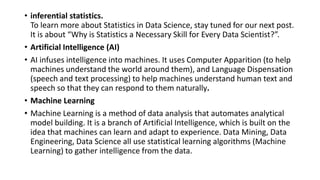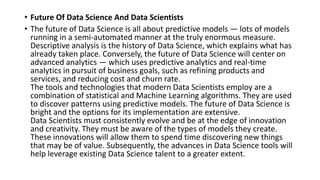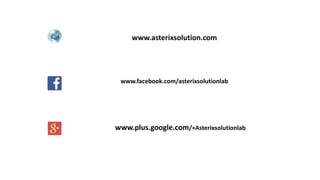Big Data Courses In Mumbai
- 1. Everything You Need To Know About Data Science http://www.asterixsolution.com/big-data-hadoop-training-in-mumbai.html
- 2. • Data Science is the right approach to obtaining, exploring, modeling and interpreting data. There are still a few industries that are unaware of the potential of Data Science, and how it can help them. It is just a matter of time before they begin to feel the necessity of the “Data Science approach” to run the business better or rather, to survive. • The increasing importance of Data Science has, in turn, led to a demand for Data Science professionals. Data Science is now an integral aspect of leading brands, businesses, public agencies and non-profit organizations. Various Data Science professionals are working tirelessly to make sense of large amounts of data to discover relevant patterns and designs in them. They are enabling businesses to effectively utilize the data, and realize future goals and objectives.
- 3. • There is a lot more to Data Science besides discovering the patterns in existing data. It is as much about the tools and skill sets as it is about domain knowledge and trust in stakeholders (and vice versa). • This blog will take you through the following key sections: • Recent Trends In The Data Science Industry • Why Consider Data Science As A Career Option • Who Can Learn Data Science • How To Learn Data Science • Prerequisites To Learn Data Science • Skills Expected From A “Modern Data Scientist”
- 4. • Various Roles In Data Science • Industry Verticals Employing Data Science • Important Topics In Data Science • Future Of Data Science And Data Scientists • Before we discuss why one should consider Data Science as a career option, let’s take a look at some of the recent trends in Data Science. This would further strengthen the argument. • Recent Trends in the Data Science Industry • Harvard Business Review has labeled Data Science as “The Sexiest Job of the 21st Century”. • McKinsey & Company anticipates a shortage of 1.5 million Data Scientists globally in the coming years.
- 5. • As per the recent report by Kaggle, Data Scientists are in high demand and short in supply. Therefore, a degree in Computer Science is not mandatory to get a job. • Tech giant IBM anticipates that the demand for Data Scientists will soar to 28% by 2020 • Why Consider Data Science As A Career Option • According to statistics shown in the Analytics & Data Science India Jobs Study 2017, India presently contributes to 12% of worldwide analytics and Data Science job openings, which makes it a chief hub for analytics in the world, after the US. In fact, a report suggests India has 50,000 vacancies in analytics. • It’s evident that Data Science has made its mark in every sector it’s been employed.
- 6. • It is swiftly spreading across a multitude of sectors from finance and energy, to travel, government and more. Due to the increased demand for this profession, universities have begun to recognize the importance of offering courses and programs in this field. A pictorial representation of “Potential career opportunities of a Data Scientist” is shown below • Who Can Learn Data Science • Fresh college graduates who are curious to learn quantitative/statistical analysis, and have a fair knowledge of programming can pursue a career in Data Science. One doesn’t have to necessarily possess a degree, or a Ph.D. to become a Data Science professional. It just requires you to know the fundamentals of analytics, basics of data processing and capability to access analytics tools.
- 7. • How to Learn Data Science • Eminent institutions like Columbia University, MIT and others are implementing campus-wide initiatives to increase learning opportunities for aspiring data scientists. Furthermore, the master’s programs at UC Berkeley and NYU have given students the opportunity to study and develop a career in Data Science. • An alternative approach to learning Data Science is to take up a modular approach and opt for short, certified, quality MOOCs. These courses deliver a hands-on experience and practical knowledge of Data Science concepts. Also, MOOCs are affordable than the Master’s Data Science degree programs.
- 8. • Prerequisites to Study Data Science • To pursue Data Science, there isn’t a specific strict educational background requirement. Data Scientists come from various educational and employment backgrounds. The majors that accord themselves with Data Science are: • Statistics • Mathematics • Economics • Operations Research, and • Computer Science.
- 9. • These domains are the foundation pillars. Data Science professionals are usually strong in one or two of these domains, and not equally strong in all. It is rare to find a Data Scientist who is truly an expert in all the above-said areas. • Skills Expected From a Modern Data Scientist • The challenge for earning a job as a Data Scientist is that organizations hire highly competent individuals. They need professionals, who are competent in handling modern tools. They seek experts who can identify appropriate methods and models to design human-friendly interfaces. Hence, it is difficult for the next generation of data scientists to utilize the abundant opportunities. • Thus, for aspiring Data Scientists to successfully extract business value from huge, messy data and to land in eminent job roles, they need to portray certain vital skill sets and they are:
- 10. • Various Roles In Data Science Sector • Every organization has unique data problems with its own complexities. Solving different Data Science problems requires different skill sets. Data Science teams are groups of professionals with varied skill sets. They, as a team, solve some of the hardest data problems an organization might face. Each member contributes distinctive skill set required to complete a Data Science project from start to finish. • There is a lot of confusion about different Data Science roles and their responsibilities. It’s hard to devise a general understanding as to how roles differ and the skills they require.
- 11. • One way to better understand different data science roles is by looking closely at job descriptions, responsibilities and skill requirements. These listings provide details and answer questions like “how similar or different these roles are”, “what technologies each of the roles require”, and “what responsibilities they entail”. Industry Verticals Employing Data Science • Before Data Science was popularly known amongst industry verticals, most companies weren’t aware of new age Data Science tools. They didn’t know how to analyze and explore the collected data. Despite the thorough collection of broad sales figures and customer information, drilling down the data and drawing insights from it was time-consuming. This required the expertise of a niche Data Scientist.
- 12. • The growth in popularity of Data Science and Analytical tools has changed the perspective of how industries operate. Data Scientists are armed with high-end analytical tools which allow them to create powerful visualizations from company data and use it to benefit the organization. • So, which industries are now benefiting from data insights and more importantly, how? Let us look at some of these industries. • Energy Industry A strong argument in the energy industry is that the usability of Data Science and related skills will increase. In low oil price environments, organizations look for cost reduction insights from data.
- 13. • During growth periods, Data Science will help the management make better decisions by providing insights, and improve production to meet the market demand. The continued growth of Data Science tools will help businesses evolve. • Banking Industry • The face of banking is changing rapidly. Consider any facet of banking – risk management, pricing, marketing outreach, customer outreach, product development, cost and revenue allocation – Data Science is a vital aspect. Banks are utilizing Data Science in sectors like Sales & Marketing, Risk Management, Fraud and Security, Compliance and Regulation, Trading and Transactions and others. • Insurance Industry • Data Science supports insurance companies to build business models and several other insurance products. These products assist companies to stay profitable while attracting new clients and retaining existing ones. It also helps insurance companies enter new market segments. For instance, the adoption of FDI in the Indian insurance sector has now increased to 49%. Progressively more insurance companies are expected to enter the Indian markets.
- 14. • Agriculture Industry • The study of genetics has revolutionized farming. Now, with the arrival and development of Data Science, the scope of genetics has increased. The application of Data Science has always helped gene editing. Scientists employing this technique can remove negative traits from an organism, and bring in positive traits without introducing a foreign gene. This can revolutionize agriculture as well as farming. Apart from gene editing, Data Science is used to improve fertilizers. It is also applied to analyze the lands and to optimize farming to get the best harvest. Thus, we can conclude that Data Science has become an inevitable part of almost every business and industry by looking at trends in the current market. More sectors are benefiting from Data Science today than ever before. The above list highlights some of the popular sectors that are being benefited by Data Science.
- 15. • Important Topics In Data Science • The continuing importance of Data Science is not a fact to be ignored. One thing is clear that the field is here to stay. However, what a Data Scientist does will evolve. With technologies like Machine Learning becoming ever-more commonplace and emerging fields like Deep Learning gaining significant traction amongst researchers and engineers — and the companies that hire them — Data Scientists continue to ride the crest of an incredible wave of innovation and technological progress. Data Scientists work in a space which is at the juncture of coding, statistics, and critical thinking. Josh Wills says, “A Data Scientist is a person who is better at statistics than any programmer and better at programming than any statistician.” Any comprehensive data science course will cover:
- 16. • Python and R • Python and R are the two most popular programming languages. Data Analysts and Data Scientists mostly use these languages. Both are open source and free. R is used for statistical analysis and Python is used as a general-purpose programming language. Therefore, for anyone looking to study in Machine Learning, or working with large datasets, or creating complex data visualizations, knowledge of Python and R is an important prerequisite. • Statistics • Statistics studies methodologies to gather, review, analyze and draw conclusions from data. Some of the statistical concepts useful for data scientists are mean, regression analysis, skewness, kurtosis, variance, and analysis of variance. The two main statistical methods that data scientists use for analysis are descriptive statistics and
- 17. • inferential statistics. To learn more about Statistics in Data Science, stay tuned for our next post. It is about “Why is Statistics a Necessary Skill for Every Data Scientist?”. • Artificial Intelligence (AI) • AI infuses intelligence into machines. It uses Computer Apparition (to help machines understand the world around them), and Language Dispensation (speech and text processing) to help machines understand human text and speech so that they can respond to them naturally. • Machine Learning • Machine Learning is a method of data analysis that automates analytical model building. It is a branch of Artificial Intelligence, which is built on the idea that machines can learn and adapt to experience. Data Mining, Data Engineering, Data Science all use statistical learning algorithms (Machine Learning) to gather intelligence from the data.
- 18. • Future Of Data Science And Data Scientists • The future of Data Science is all about predictive models — lots of models running in a semi-automated manner at the truly enormous measure. Descriptive analysis is the history of Data Science, which explains what has already taken place. Conversely, the future of Data Science will center on advanced analytics — which uses predictive analytics and real-time analytics in pursuit of business goals, such as refining products and services, and reducing cost and churn rate. The tools and technologies that modern Data Scientists employ are a combination of statistical and Machine Learning algorithms. They are used to discover patterns using predictive models. The future of Data Science is bright and the options for its implementation are extensive. Data Scientists must consistently evolve and be at the edge of innovation and creativity. They must be aware of the types of models they create. These innovations will allow them to spend time discovering new things that may be of value. Subsequently, the advances in Data Science tools will help leverage existing Data Science talent to a greater extent.


